Naturally, in the life of a great writer no significant love remains untold. In 1977, during a period when his work took a turn toward comedy, Vargas Llosa wrote Aunt Julia and the Scriptwriter, about a young man named Mario and his bride.It’s almost a Latin American equivalent of Salinger’s “The Catcher in the Rye.” mixed with a sprinkling of Mordechai Richler and Woody Allen. Just like how children’s books work on the formula of giving children special powers, the best teenager’s fiction gives their hero or heroine, independence.
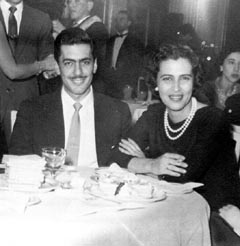
---When Vargas Llosa read Julia’s book, or as he says, flicked through the pages, he was disgusted by what he read. He claims that he could never read all of it, he felt it was a tirade against him and his second wife Patricia. He was so angry in fact that he stopped Julia’s rights to the royalties to his novel ‘City and the Dogs’ (‘Ciudad y los Perros’).---
“Mario Vargas Llosa, the 74-year-old virtuoso of Spanish prose who was awarded the Nobel Prize on Oct. 7, began his adult life with an act of sweet absurdity. As a 19-year-old university student in Lima, Peru, he fell in love with Julia Urquidi. A great beauty, she was far from an appropriate choice for a young innocent from a respectable family. She was a dozen years older and happened also to be his divorced aunt-by-marriage. She at first treated him as a callow youth, unworthy of a woman’s interest, but soon she returned his love. They married in 1955, to the disapproval of their family. They stayed together for several years and divorced in 1964, having had no children.”
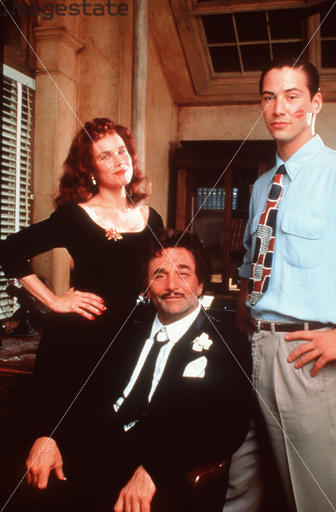
The plot line is fairly ordinary and straight forward. There is a clear line of progression - Mario and Julia's love - which is followed with unwavering intent. This simplicity of plot allows Vargas Llosa to explore a variety of interesting avenues directly relating to the creation, and appreciation, of art. Specifically, of writing. Pedro Camacho is Writing, he is a Writer and that is all - we learn he enjoys - or eats, at least - eggs and links mint-and-verbena tea, but that is virtually all. It is not important who Pedro Camacho is so much as how a Writer entering the life of a hopeful young artist can help to sway them into the concreteness of their chosen path. Mario is so impressed with Pedro Camacho that the very text devotes half of its chapters to Camacho's radio serials.
Vargas Llosa splits the story between the narrator’s nascent relationship with his Aunt, his friendship with the obsessed, genius serial-author Pedro Camacho, and Camacho’s massively popular radio soaps. There are so many balls flying up in the air at any one time that it is quite astounding of Vargas Llosa that he manages to keep it all together.
The narrator has one goal, which is to become a man of letters. He writes and writes, but the work he produces seems to satisfy only himself. His friends are sympathetic to his desire but less than enthused about his ability to tell a good story. It is believed, as the whispers go, that he does not yet have enough life experienced to write an important story. Along comes Pedro Camacho, a Bolivian radio author who writes and produces scripts for sixteen, seventeen, eighteen hours a day, every day, with everything he writes being of a very high quality. Mario is impressed with Pedro Camacho’s talent, and together they forge an unlikely friendship. While this is happening, Mario meets, and takes an instant dislike to the woman who has recently divorced his uncle, Julia. But, hormones and farce collide and they are brought together, at first merely to kiss, but then love stirs.
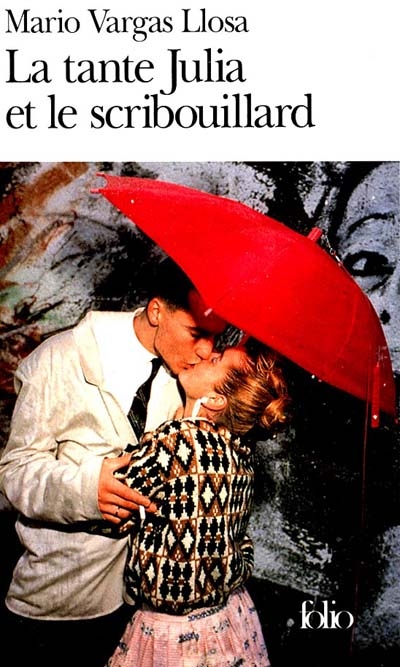
Fulford:Seen in 2010, Tune in Tomorrow looks like the least politically correct film produced in America in generations. Certainly that’s how an Albanian would see it. Blame Vargas Llosa. As he says, he lacks political correctness. He genially noted some years ago that he had probably been denied the Nobel Prize for many years because of the unusual trajectory of his politics, from standard leftist to free-market libertarian rightist, the basis of his unsuccessful campaign for president of Peru — not the sort of thing a Stockholm academic easily forgives.
These serials are initially tightly plotted, focused with a razor sharp eye, and very clever. They all end with a hook, usually in the form of a series of questions to the reader, pondering what a character will do or how a scene will play out. ‘Would Red Antunez desert his reckless, foolhardy spouse that very night? Might he have done so already? Or would he say nothing, and giving proof of what might be either exceptional nobility or exceptional stupidity, stay with that deceitful girl whom he had so persistently pursued?’ We are firmly within soap opera territory here, with melodrama, familial tension and punch action. What happens, though, is that as the novel progresses and Pedro Camacho’s grip on reality loosens, the stories begin to melt, to mesh and merge with one another. Characters from previous stories appear as though they had always existed within the confines of the current chapter. People die, then are alive as though nothing has happened – only to be killed again, in a series of unfeeling cataclysms. Pedro Camacho, talking to Mario, explains that he tries to end everything in death, now, because he cannot remember his characters well enough to trust himself to continue their stories beyond a half hour serial. As Pedro Camacho’s stories implode, the parallel and main plot advances at a quickening pace as Julia and Mario plan for their wedding. While Camacho’s stories lose focus Mario’s own story gains it, hurtling forward to where it was always meant to go, while Camacho’s end up in a tangled mess.
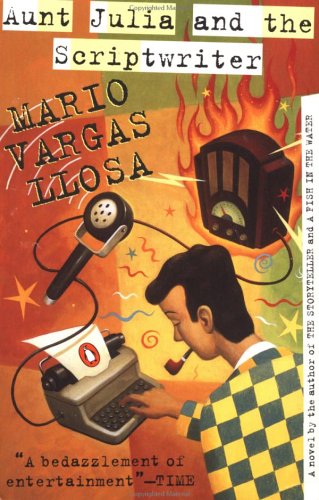
William Kennedy:Pedro Camacho is a small man with long hair, not quite a dwarf, fastidious in threadbare suit and bow tie, who has come to Lima not only to write soaps for radio but also to direct and act in them. Camacho is little more than a cartoon at first, but as the story progresses Mario views him with increasing awe. And as we are exposed to his soaps - which are related at length - the man becomes a cartoon of substance, a brain worth scanning. The problems that beset Camacho - his fear of aging, his niggling comic hatred of Argentines (he has his reasons), his constipation, his championing of masturbation for actors and priests - turn into the stuff of his scripts, their mundane reality carried to dramatic extremes. And so the soaps become the blueprints of Camacho's imagination, and what we are given is a privileged view of the arcane and volcanic reaches of a writer's psyche.
The writing is unlike Vargas Llosa’s recent work in that it is densely layered and intricately woven together, with little extensions and turrets of meaning sprouting from sentences as clauses are added and added. To describe Pedro Camacho’s directing methods: ‘It was not instructions he was giving them, at least not in the prosaic sense of concrete indications as to how they were to speak their lines – in measured tones or exaggeratedly, slowly or rapidly – but rather, as was his habit, noble, olympian, pontifical pronouncements having to do with profound aesthetic and philosophical truths. What a mouthful! And then, And naturally it was the words “art” and “artistic” that were repeated most frequently in this feverish discourse, like some sort of magic formula that revealed and explained everything.’This is heavy writing, tight and compact in its theme part far reaching in the elaborate nature of its composition. Happily, the writing never becomes so weighty as to tip over the text, instead it remains consistent in its approach to explore and understand the difficulty of art and, later, love. Vargas Llosa was to go and relax this heavy method of writing for the freer, more freely flowing stylings of The Feast of the Goat and The Way to Paradise, but Aunt Julia and the Scriptwriter remains interesting and compelling along with its desire to exhaustively examine and minutely describe.
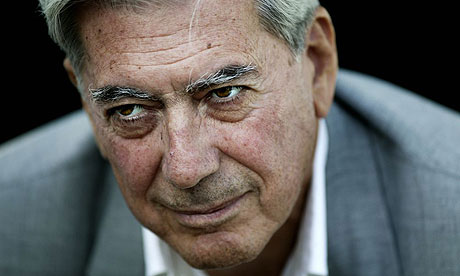
Kennedy:He writes 10 half-hour installments a day for his serials, one an hour, then works seven more hours rehearsing and recording them. ''The scripts,'' Mario recalls, ''came pouring out ... each of them exactly the right length, like strings of sausages out of a machine. ... I once told him that when I watched him work I was reminded of the theory of the French Surrealists with regard to automatic writing, which according to them flowed directly from the subconscious, bypassing the censorship of reason.'' Camacho replies, ''Our mestizo Latin American brains can give birth to better things than those Frogs.'' Camacho lives monastically, loathes money, snubs the fame his serials give him. When he writes, he assumes roles physically, wearing false mustaches, a fireman's hat, the mask of a fat woman. Mario finds him at his enormous typewriter, writing about the birth of triplets. He is in a white smock, surgeon's skullcap and long, rabbinical black beard. ''I'll do a Caesarean on the girl,'
9; he tells his visitor, ''and then I'll go have ... tea with you.''The love story of Aunt Julia and Mario is perhaps the weakest link of the novel. We understand that he loves her, but we do not understand why he loves her. Why her? Why his Aunt, which would, and does provide conflict with the rest of his large family? The novel should put forth an explanation, either by Mario’s internal musings, or through the exotic or expressive or enchanting presence of Julia, but none of these things occur. She is a nice, pleasant character, but it is difficult to understand the sudden and deep love the narrator feels. It is almost as though he wants to love this woman because he knows that such a romance would provide a great deal of fodder for his artistic expression.
But no matter. Aunt Julia and the Scriptwriter works on so many levels that the few missteps can be forgiven. Vargas Llosa’s work is dense, intelligent, and deeply concerned with the artist’s place in the world. The odd chapters concerned with Mario’s love for Aunt Julia, and his quest to become a writer are interesting and thoughtful, while Pedro Camacho’s even chapters are by turns dramatic, vengeful, nasty, curious, deceitful, pretty.
ADDENDUM:
Fulford: Since American prejudice against Argentina didn’t seem credible, Boyd had to devise a substitute scapegoat. “I tried to pick some people who would not land me in trouble,” Boyd explained when I asked him about this project several years ago. Albanians were his choice. He was writing in 1989, when Albanians were still locked in a silent Stalinist dictatorship. Little had been heard of them. Their newsworthy tragedies were in the future.
So in the film anti-Albanian comments dominate Pedro’s scripts. New Orleans radio listeners love his stories but the Albanian Liberation Organization remains unamused. They burn down one radio station that carries his dramas.
As racism it’s sometimes uncomfortable and Roger Ebert, in his review, said Boyd should have chosen to malign Canadians. But the joke is mainly on Pedro, a blindly obsessive bigot and a self-important artist who believes his plays light up the “miserable, impoverished, dull, and worthless lives” of the listeners. While claiming to have nothing against Albanians, he argues that the wretched masses need to hate somebody.





 COMMENTS
COMMENTS
My two grandmas were fans of radio soap operas (no tv then here) that they listened to from a very famous Cuban broadcast; that was happening before Revolution, when Cuba was a very advanced country in Latinamerican terms. I have read about those programs: all noises were heard, the wind, the rain, a closed door, steps, a horse running, etc. Those Cuban soap operas were very famous everywhere in Latin America. I still remember “The right to be born”, even a film was made later.
They all seem to have been inspired by Orson Welles to some extent, who pioneered that ”live effect” of radio with his ”War of the Worlds” , though my knowledge of radio drama history in Latin America is nil.